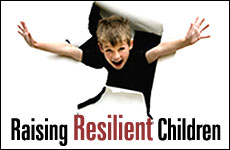 Identifying as a Jew
Identifying as a Jew


4 min read
How do we help our children feel safe when the world feels so unsafe?
From the moment a parent holds their newborn in their arms the overwhelming weight of their child's incredible dependency and vulnerability presses in on them. As parents today we are especially informed, perhaps over-informed, of the dangers of our modern world. So much so, that our parenting has been nick-named parenting in the age of anxiety. The question then becomes, how do we help our children feel safe when the world feels so unsafe?
Some parents respond to this question by attempting to create a hermetically sealed world, a perfect parenting bubble that will keep their children safe from harm. This is the classic response of the over-protective parent. Yet psychologists know that the most over-protective parents do not in turn create the strongest and healthiest children. If anything, like hot house flowers, these over-protected children begin to wilt upon confronting the real world. Whether that confrontation comes in adolescence or even in adulthood, these "protected" children are ly unprepared to cope with the realities of life's challenges.
Our goal as parents is not to create a perfect world for our children, but rather to empower our children to deal with the world that exists beyond our doorstep. From the age of five year olds, and perhaps even younger, our children will find themselves in a school setting. Often they are expected to deal with bullies and other complicated social dynamics that unnaturally promote some children over others. How can we ensure our children thrive during their school-age years and beyond? We need to teach them how to cope by teaching them problem solving skills and then praising their fledging attempts at confronting and solving life's problems.
I was in the park with my five-year old daughter who was showing off by standing on the moving swing and jumping off in mid-air. At one point she slipped, and I saw her lying face-down on the ground terrified while the swing continued to travel wildly overhead. Even as my body tensed to jump up and run to her rescue -- I would grab the swing, and pull her to safety -- my eye detected a slight movement. She was slithering forward on her stomach, carefully guiding herself to safety.
If I could control my own need to rush in and play the savior, I would be able to use this moment to build her identity as a resilient person.
Thankfully I recognized the moment for what it was. She was coping, slowly, fearfully, but coping. If I could control my own need to rush in and play the savior, I would be able to use this moment to build her identity as a resilient person, a person who copes when life throws you a curveball. I sat there, physically restraining myself from running to her. She was dealing with the danger in her own way, and this opportunity to emerge with a sense of her own competence and self-protective skills was far too precious to be lost.
When she had cleared the swing, she jumped up and ran to me. Rather than comforting her and re-enforcing her sense of self as the victim of a bad experience, I praised her. How cleverly she acted. How carefully she guided herself to safety. How I see that she knows not only how to swing, but also how to be safe, even when she falls off. My response helped her to feel competent and strong, rather than weak and vulnerable. She ran back to the swings.
I am not advocating abandoning our children and forcing them to cope prematurely with developmentally inappropriate experiences. I am not advocating teaching coping by throwing them into a pool and demanding, "Now swim!" Rather I am advocating a system of watch, wait, and listen. When you see your child confronted with a challenge, ask yourself if it is something they can handle alone, not because you are too busy to help, but rather in order to build their identity as a person with coping skills, a person with resilience.
The Talmud teaches that a father has an obligation to teach his children to swim. The reference is understood to mean that parents must teach survival skills, and not only Torah, to their children. In our generation we know that the socio-emotional journey of moving through life is fraught with challenges. Yet while we know more than ever about the psychological after-effects of these challenges, we seem to know less than ever about the art of dealing with them.
Be on the look-out for moments when your child initiates a process of coping. During those moments, if you think the challenge is developmentally appropriate, hold on tight to yourself, and pray, because this is a moment when your child can learn not only to survive, but also to thrive.
